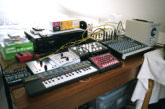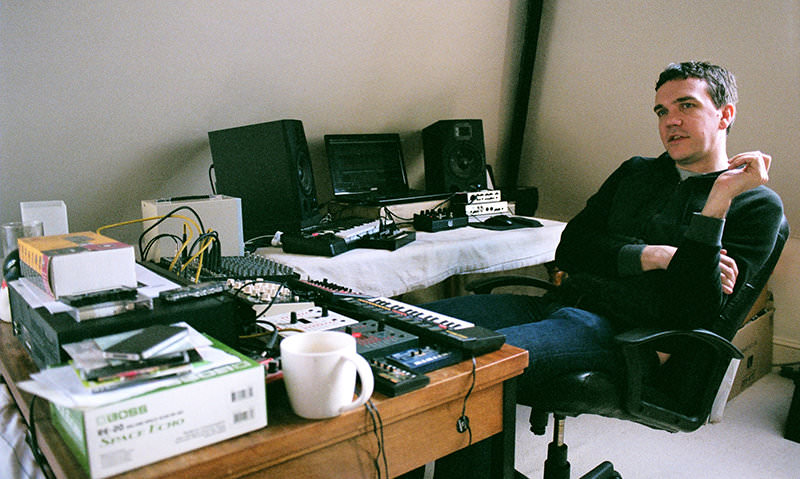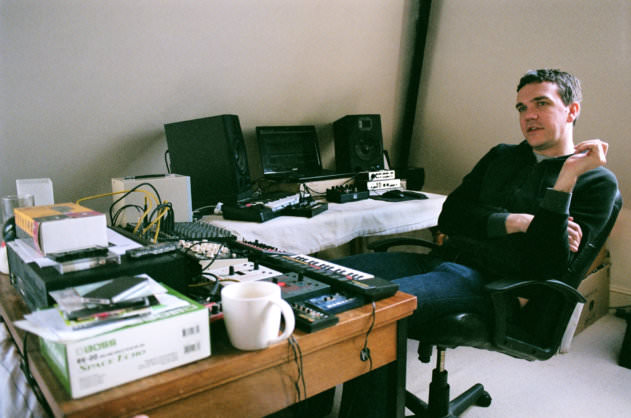As he releases his second album, we speak to the London-based techno artist about his production techniques, the themes of Wicker & Steel and The Power And The Glory, and why he’s bemused by so much of the analysis of his music.
It’s inevitable that the perception of art by sections of the media and public will occasionally be at odds with the artist’s original intentions. That’s certainly the case for north London-based techno producer Ali Wells, aka Perc.
In 2011, Wells inadvertently found himself cast as a figurehead of politically motivated industrial techno, his debut album Wicker & Steel described by the Guardian as “a bleak audio montage of a Britain beset by riots, phone hacking and economic uncertainty”.
In an RA feature last year, Wells appeared uncomfortable with the suggestion that his music was a direct response to political issues. “I don’t see a news report about a downturn in the British economy, or the 100% cut in arts funding in Newcastle, and then run to the studio to express my anger in the form of a techno track,” he said. “My energy would be far better spent playing an active role in campaigning, protesting and raising awareness, not making a track to keep Berghain moving at nine in the morning.”
We met him in his bedroom studio to find out about his creative process, discuss the making of his new album, The Power And The Glory, and discuss why analysis of his music as the soundtrack to social disorder is so wide of the mark.
(For a closer look at the studio itself, check out our My Studio feature here.)
Attack: Do you prefer to have your studio at home? Some people like to have a bit more separation between home life and music life.
Ali Wells: Yeah, especially if you’ve got a wife and kids I can understand you’d want to cut off and just say, ‘I’ll be home at seven o’clock’. But because I love what I do, I don’t really start and I don’t really stop. It’s just constant. I’m also one of those weird people who’ll have Ableton ticking over and then be answering emails too. Some people turn off their internet and get into this producing zone, then eight hours later they’ll check their emails and see if anything’s happened. I’m always running Perc Trax, looking at stuff on the internet, producing, whatever – it just works.
Do you mix everything here?
For the bigger projects I’ll mix down at Vibrate studios in New Malden, which was opened by Meat Katie and Marvin Beaver. It’s just a different monitoring environment and it’s all acoustically treated. I don’t use any of the equipment there, I just plug into the monitors. The first time I went down there they wanted someone to sit in with me until I knew what I was doing. They’ve got racks and racks of compressors and things and I told them I didn’t actually want to use any of it. Even for the album I think I only had two 12-hour days in there. It was all pre-mixed at home and some tracks had been tried out in clubs already.
So, to go back to the beginning of the process, were all the tracks made specifically with the album project in mind? Is it all new material from over the course of the last two years?
 Yeah, there’s nothing that was made before Wicker & Steel or even anything that was left over and put aside. As soon as I finished that album I started doing other projects and sometimes little loops and sounds would come up and I’d put them in a possible album
Yeah, there’s nothing that was made before Wicker & Steel or even anything that was left over and put aside. As soon as I finished that album I started doing other projects and sometimes little loops and sounds would come up and I’d put them in a possible album
folder. When I finally stopped taking on collaborations and remix requests and blocked out some time to make the new album I started going back to all these ideas and none of it felt suitable, so the whole lot got scrapped. The album’s completely fresh.
I’m not exactly sure when I started it but it took about four months in total, I think. I started off with the tracks I had in mind for vocals first because I knew it’d take time for the vocalists to get their arses into gear and get things working. For a while I was just producing whatever track I wanted, then a bit further down the line I realised the album needed a few more tracks of a certain style and I kind of pushed myself in that direction.
I started going back to all these ideas and none of it felt suitable, so the whole lot got scrapped.
After Wicker & Steel was it obvious to you that you were going to make another album?
It was always the aim, yeah. I was actually pretty unconfident about Wicker & Steel when it was finished. It was my third or fourth attempt at making an album and most of those were binned after two or three tracks were completed. In the end it was going nowhere so I spoke to the people that I wanted to do the PR for it and set a date to send out the press release. That’s the only thing that got my arse in gear. I had it mastered the day before it went out to press.
I was actually pretty unconfident about Wicker & Steel when it was finished.
With this album I was a bit more confident and I had more of a plan of what I wanted to do. With Wicker & Steel that track ‘My Head Is Slowly Exploding’ was really the catalyst for the whole album, whereas for this album there wasn’t really a key track that unlocked the whole process. A lot of the tracks were worked on simultaneously – on different evenings I was bouncing between different tracks – so it’s almost like this album crept up on me. I didn’t think it was really going anywhere, then suddenly I looked and there were eight tracks and the core of the album was 90% done.


07.12 AM
Seems a decent down to earth fellow. Nothing worse than people putting words into your mouth so it’s nice to hear his own thoughts on the “political motivation” (or lack thereof) behind his work.
10.24 AM
Good interview. There’s an interesting postmodernist debate to be had around the idea of authorial intent in auteur techno. Ali seems incredibly gracious in allowing people to project their own meaning onto his work. I think I’d be a bit more frustrated by that kind of pseudo-intellectual stuff being written about me. Analysis of techno (and other music) is great but there’s a big difference between drawing parallels and making connections as opposed to making definitive statements about artists’ intentions. The Duggan anecdote he tells above is hilarious. Talk about clutching at straws to try and force a social narrative onto the timing of a promo!
The Power & the Glory is excellent. Really enjoying Ali’s work and most of the Perctrax output over the last couple of years.
01.08 PM
I love this. The guy’s making some of the darkest, most brutal, face-pummelling techno around. What’s his studio? A table at the end of his bed with a £5 Casio keyboard, a couple of Monotrons and a fuzzbox. Oh, and a copy of the rough guide to techno. Love it.
He comes across as a really good bloke too. I haven’t checked the new album out yet but I’m off to give it a spin now.
Thanks
08.33 PM
Politics, music and personal world. The real parts of an artist. Thanks for the interview!
09.13 PM
Sounds like a sound bloke – who makes great sounds . Sound! anyway I always thought techno music is kind of ambiguous like make of it what you will which I suppose is part of it’s appeal to me. Good work Perc